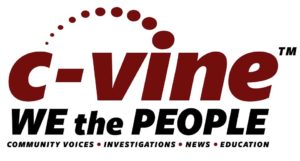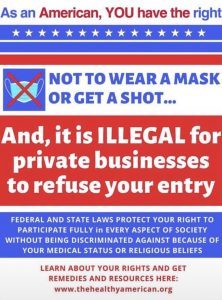 August 5, 2021
August 5, 2021

HIPAA Laws Protect You Against Mandated Presentation Of Private Medical Information
By: JoLynn Live – C-VINE NewsAugust 5, 2021
‘Show proof of COVID-19 vaccination status or be terminated,’ was the threat to one recipient. Here is her reply:
Dear [REDACTED] and the [REDACTED] Board of Directors,
Thank you for your reply of July 30, 2021. While I am deeply disappointed with the Board’s decision to continue with their vaccine push and records requirement policy, there were several points brought up that I wish to address.
Please tell me which statute, regulation or law on which you are relying that the [REDACTED] organization, a non-medical, non-healthcare related entity, not a “covered entity” according to HIPAA, nor specifically exempted from HIPAA regulation, can compel me, a private citizen, to turn over my protected health information to your organization.
Having worked in the medical field and directly with HIPAA laws, it was my job to understand the HIPAA legislation, and I understand that it was designed to protect a patient’s medical record from being divulged to person’s outside of the need to know.
According to HIPAA, “covered entities” which include health plans, most health care providers, and health care clearinghouses, are allowed to have access to a patient’s medical record, and must comply with privacy standards related to protecting that health information. Vaccination status is part of a patient’s medical record and therefore cannot be required to be divulged to persons who are not directly involved with that patient’s medical care. You can ask, but according to the HIPAA law, it is my understanding that patients are not required to hand that information to you.
[REDACTED] singers such as myself, from what I can see, are under no legal obligation to share their personal Protected Health Information with you, and your organization does not have the legal right to require singers to divulge their Protected Health Information. Non-covered entities who are NOT required to follow HIPAA Privacy and Security rules include employers, municipalities, life insurers, workers compensation carriers, schools, school districts, state agencies, and law enforcement.
Your organization as a community group does not fall within the purview of HIPAA as a covered entity, nor as a non-covered entity that does not need to follow federal Privacy and Security rules. As such, I can see no legal basis for which one is obligated to share their protected health information with you.
Equally, I see nowhere in law, regulation, or statute where an entity such as the [REDACTED] community organization has a “duty” to require “papers” or proof of vaccination in violation of HIPAA regulation and/or guidance that only Covered Entities can, and Non-Covered Entities specifically exempt from HIPAA can, access private Protected Health Information. It is my understanding that when it comes to non-healthcare related entities having no direct role in a patient’s medical care, it remains the patient’s choice, and theirs alone, as to who does, and who does not, have a right to view their Protected Health Information.
Federal law, per the FDA, prohibits any persons from being coerced to take an Emergency Use Authorization product such as the Covid-19 vaccine. Title 21 CFR is clear that in order to receive an experimental medical treatment, the subject must be given proper informed consent. Informed consent includes having the option to not participate with no loss of rights or benefits to which someone is otherwise entitled. Requiring the Covid-19 vaccine in order to participate in events with the [REDACTED] organization could certainly be perceived as coercion, since not allowing someone the ability to participate in events unless vaccinated could coerce them into receiving the vaccine.
Stating that the unvaccinated pose a risk or threat to the [REDACTED] organization is completely without basis in science. In fact, according to a recent news release by the CDC, and their change of the mask mandate, it is the vaccinated who are more likely to infect others with the Delta variant.
Further, a blanket requirement by your organization to receive an experimental vaccine does not acknowledge those patients whose doctor has advised them against receiving the Covid-19 vaccine due to health reasons or for those having developed natural immunity due to already having had Covid. There are times when a vaccine is not recommended nor appropriate, and these decisions are best left for doctors and their patients to decide on an individual case-by-case basis.
The [REDACTED] organization, is a non-medical, non-healthcare related entity not involved in patient care. By requiring people to receive the experimental Covid-19 vaccine, perhaps against their doctor’s advice, you are inserting yourselves between doctor and patient, thereby interfering with a patient’s protected health decisions. In other words, since you are not a healthcare organization nor involved directly in patient care, you have no basis in law to dictate a person’s private medical decisions that are for him/her to decide in consultation with a medical professional.
Additionally, there are laws in place that protect patients from being coerced to divulge private health information by those who are not medical professionals and are not directly involved in the patient’s care. Certain organizations that obtain Protected Health Information and do not follow strict privacy and security measures outlined by the HIPAA regulation may face fines or lawsuits.
By collecting or otherwise obtaining Protected Health Information, your organization becomes liable to protect such information, preferably using measures outlined in the HIPAA privacy and security guidelines. This does not address, however, your right to even have such information at your disposal.
All of these scenarios can be avoided by simply refraining from adopting policies that collect and disclose Protected Health Information, require experimental vaccination, or penalize members for choosing not to be vaccinated.
Regarding Safety and Efficacy:
Previously, I made mention of the possibility of a vaccine injured person bringing lawsuit against those who coerced them to get the vaccine. Even if one thinks something like that would never happen, (and hopefully never does) this possibility should not be summarily dismissed. Anyone can bring a lawsuit for damages or injury. To say that there is “no risk” of being sued in this manner discounts a very real possibility, no matter how remote one may think the risk is.
Any statements about the safety or efficacy of the Covid-19 vaccine are premature and not based in science. Safety and efficacy can only be ascertained after requisite clinical trials have been completed and the data has been compiled and analyzed to make that determination.
According to the VAERS reports of online injuries related to the EUA vaccines, there are nearing 500,000 documented adverse events reported (as of July 27, 2021) of a wide range of serious adverse events, up to and including death resulting directly from the vaccines. To claim the Covid-19 vaccines are safe is at best, speculation, and perhaps wishful thinking that could be clarified and put to rest by viewing the VAERS database online.
It seems to me there is significant legal risk involved in coercing people to be the unwilling subjects of medical research and in collecting or storing their private health information. At some point, tort lawyers may decide to weigh in and begin filing class action lawsuits on behalf of injured people and those who feel their rights to privacy were violated by businesses coercing them to divulge protected health information, or to receive experimental vaccines without them being given the right to opt out without risk of reprisal.
I imagine lawyers would love to take on cases where a non-medical entity, completely outside the mandates of HIPAA, would require Protected Health Information be summarily given to their organization with no reasonable expectation by those so persuaded, to know as to how their Protected Health Information would be handled, and whether your organization has the right to view that information in the first place.
Patients have the inherent right to make their own health decisions in consultation with their doctor or chosen medical professional, based on informed consent, free of coercion or intimidation, having the right to say no without risk of reprisal. Additionally, private health information is protected by HIPAA with no requirement or obligation that such information be given to persons outside the HIPAA guidance regarding privacy measures.
We all have fought very hard here in America for the right to choose what happens with our own bodies, and to make our own healthcare decisions. Do we now wish to erode basic human rights of choice which informed consent and privacy laws were established and designed to protect?
I maintain my concern for the [REDACTED] community organization that down the road there may be lawsuits, possibly class-action lawsuits that could result in legal battles which may be challenging and difficult to fight. By allowing [REDACTED] singers and members the options currently afforded to them by law in informed consent, and honoring privacy measures outlined by HIPAA, you could prevent or mitigate any potential lawsuits that could result.
I wish the [REDACTED] community organization only the best.
Sincerely,
[REDACTED]
Local Community Singer

News Posted by: C-VINE Citizen Journalists.
Please click and bookmark:


 C-VINE Social Media Channels
C-VINE Social Media Channels 


*C-VINE.Com, https://c-vine.com
*C-VINE-Telegram, https://t.me/CVINENEWS
*C-VINE-MeWe, https://mewe.com/join/C-VINE
*C-VINE-Rumble, https://rumble.com/user/CVINE
*C-VINE YouTube Channel, https://www.youtube.com/c/CVINENewsNetwork/videos
*C-VINE Commentary & Analysis, https://www.facebook.com/groups/895771901163001/
*C-VINE Business Network, https://www.facebook.com/groups/1242625425864710
*C-VINE Natural Health News Network, https://www.facebook.com/groups/cvinehealth
*C-VINE Patriot Prayer Brigade, https://www.facebook.com/groups/4826437259486216

